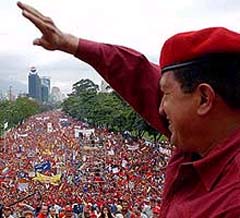Venezuela's Chavez speeds up land reform
The South American state will reclaim 500,000 hectares this year

 After years of controversy, Venezuela's President Hugo Chavez launched last weekend a program to accelerate land distribution in the South American oil-rich nation. Broadcasting his weekly Sunday TV programme from a recently-seized farm, Mr Chavez called on ranch owners to negotiate with the government.
After years of controversy, Venezuela's President Hugo Chavez launched last weekend a program to accelerate land distribution in the South American oil-rich nation. Broadcasting his weekly Sunday TV programme from a recently-seized farm, Mr Chavez called on ranch owners to negotiate with the government.
"We are not carrying out expropriation, this belongs to the nation, to the state," he said at the Marquesena farm. Mr Chavez's opponents have argued that plans for land reform violate property rights enshrined in the constitution.
Chavez's wealthy foes in Caracas rallied during the weekend demanding the government to cancel its land reform program, which aims to reclaim 500,000 hectares (1,235,000 acres) of farm land this year. The President replied that “property is not a sacred value” and vowed to go ahead.
Chavez's plan to redistribute land among poor farmers means the nationalization of large underused ranches without compensation, as according to him these productive areas have to be run for the benefit of the community.
President Chavez made the announcement from the 8,490-hectare (20,978-acre) Marquesena ranch, which is one of about 20 so far claimed by Venezuela's left-wing government. The Venezuelan state seized the farm after offering former owners 1,500 hectares (3,700 acres) of the ranch. The rest, the president said, would be used to establish a state farming co-operative.
"We can't stop with the Marquesena, we have to accelerate all of this," said Mr Chavez, who was accompanied by members of Brazil's Landless Movement. "I extend my hand to the supposed landowners to find a constructive solution," he added.
On Monday, Caracas went ahead with his plans. Local authorities seized a food plant which belonged to one of the largest food companies of the country and According to the government, it was inactive.
But the nationalization program is not only restricted to the food industry. Venezuela, the world's fifth-largest oil producer, may also take over fields operated by private companies if they don't convert operating contracts to joint ventures by a Dec. 31 deadline, Energy Minister Rafael Ramirez said Monday.
These operating contracts are illegal," Mr. Ramirez said. When asked what Petroleos de Venezuela would do if private producers refuse to convert the operations, he said, "We will assume production of the fields ourselves."
Petroleos de Venezuela currently has 32 contracts with 22 companies that operate and manage oil fields for it. The companies include Chevron Corp., Repsol YPF SA and Petroleo Brasileiro SA. Transitional agreements were signed with eight of the companies in August.
Chavez new initiatives have been broadly accepted by the poor majority, but will surely be resisted by the diluted opposition.
Subscribe to Pravda.Ru Telegram channel, Facebook, RSS!


